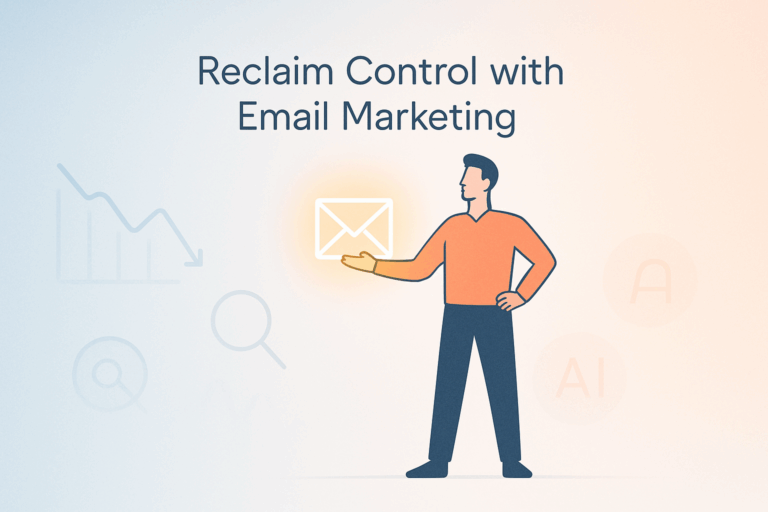Introduction to Google’s AI Mode and Its Impact on Local Search
Google has introduced a significant change in how local search results are displayed, shifting towards an AI-driven mode. More than half of users now interact with Google’s AI mode instead of the traditional search interface. This transformation means that businesses need to rethink their approaches to local SEO and online presence to remain visible and competitive. Ignoring these shifts could result in missing out on vital search traffic and potential customers.
The Rise of AI Mode in Google Search
Google’s AI mode represents a new era in search technology, where artificial intelligence decisively influences what users see. It has been integrated directly onto the Google homepage, signaling a long-term commitment. This evolution goes beyond just displaying links and snippets—it interprets queries with greater sophistication and curates search results based on a broader array of business information sources.
The AI mode compiles data from videos, business listings, social media profiles, and more to present comprehensive, context-rich search answers. This method helps end-users receive richer, more informative local search outcomes. However, this also means businesses can no longer rely solely on traditional SEO tactics to be found online.
Why Businesses Must Adapt to AI Mode
With more than 50% of search users choosing AI mode, the landscape for local business visibility is shifting dramatically. Businesses that have not optimized their presence for this newer mode risk fading into obscurity in search results.
The AI mode prizes businesses that maintain consistent, up-to-date, and versatile online profiles. This includes multimedia content like videos, accurate directory listings, and active social media engagement. Being proactive to these changes means staying competitive and reaching potential customers effectively.
Optimizing Your Business for Google’s AI Mode
Effective optimization for AI mode requires a multifaceted approach that extends beyond your Google Business Profile (GBP). Here are three essential strategies:
First, creating and maintaining a YouTube channel is critical. Video content is now a vital element in AI search results, often heavily cited to demonstrate business authenticity and engagement levels. Even if your business isn’t producing traditional marketing videos, simple informative clips, introductions, or customer testimonials can make a significant difference.
Second, accuracy in business citations is indispensable. Directories like Yelp, BBB, and TripAdvisor are frequently referenced by AI mode during the search process. Your business listings on these platforms must have consistent information regarding your name, address, phone number, and other key details. Inconsistencies can confuse AI systems and harm your local search ranking.
Lastly, social media activity has gained importance. Google uses social media signals to understand your business better, and AI mode prioritizes those signals as well. Regular posting on platforms such as Facebook, Instagram, and LinkedIn helps strengthen your digital footprint and signals relevance to search algorithms.
Leveraging YouTube for Enhanced Visibility
The Importance of Video Content in AI Search Results
Video content now plays a prominent role in AI-enhanced local searches. Google’s AI frequently references videos to provide users with a deeper understanding of businesses. Videos can convey trustworthiness, showcase products or services, and present customer experiences more compellingly than text alone.
Having an active YouTube channel signals to Google that your business is invested in building connections and remaining current in online trends. Videos also increase the likelihood of your business being featured in rich search result formats, which attract higher user engagement.
Creating and Maintaining a YouTube Channel
It’s not enough to simply create a channel; consistent content uploads are important. Businesses should consider posting at least a few videos regularly to keep their audience engaged and to grow the channel’s reputation.
Content ideas include product demos, behind-the-scenes looks, staff introductions, and customer testimonials. Optimizing video titles, descriptions, and tags with relevant keywords remains a foundational practice to improve discoverability. Visual quality and authenticity can further enhance viewer trust and increase shares.
Ensuring Accurate Citations Across Online Directories
Key Business Listings to Monitor
Several third-party directories play a large role in AI search algorithms. Yelp, Better Business Bureau (BBB), and TripAdvisor are among the most influential. Google’s AI retrieves and cross-references business data from these sources to verify legitimacy and accuracy.
Other relevant platforms include local chambers of commerce, industry-specific directories, and mapping services. Regularly auditing these listings helps resolve discrepancies and prevents confusion for AI systems.
Maintaining Consistency in Business Information
Consistency is paramount. Even small variations in your business name, address, or phone number—known as NAP data—can reduce AI confidence in your listings. If there’s inconsistent information online, it introduces doubt about your business’s authenticity and reliability.
Regularly updating and syncing your listings ensures uniformity. This goes beyond just the basics; categories, operating hours, and website URLs should also be checked for accuracy.
Utilizing Social Media to Strengthen Online Presence
Platforms That Matter for AI Mode Recognition
The significance of social media channels is increasing in tandem with AI mode search. Google uses social media to gather real-time signals about your business reputation and community engagement.
Facebook, Instagram, and LinkedIn are particularly impactful social platforms for business-related AI learning. Actively maintaining profiles on these sites with up-to-date information and regular interactions benefits your search standing.
Effective Social Media Practices for Businesses
Posting regular updates, such as news, promotions, and customer interaction, encourages engagement and signals activity. Responding to comments and messages on social channels fosters positive reviews and shows a commitment to customer care.
Visual content—photos, short videos, infographics—tends to perform better and supports brand recognition. Using relevant hashtags and tagging locations can also widen your reach organically.
Integrating Social Media with Your Google Business Profile
Linking social profiles to your Google Business Profile offers an additional layer of trustworthiness. Google can better associate your social signals with your business, creating a richer portrayal in search results.
Make sure social media accounts display consistent NAP data and include links back to your website and Google Business Profile for streamlined user experience.
Comprehensive Online Optimization for AI Search
Beyond Google Business Profile: Building a Holistic Presence
Optimizing AI search results requires a layered approach. While the Google Business Profile remains critical, a comprehensive online presence wins the day.
This involves video content, meticulous citation management, social media activity, website SEO, and online reviews. Ensuring these elements work together cohesively presents a compelling and complete business profile to AI algorithms.
The Role of Automation in Managing AI Mode Optimization
Managing all these components manually can be overwhelming. Automation tools designed specifically for local businesses can help streamline these efforts, ensuring continuous optimization without excessive time investment.
These tools can schedule social media posts, update citations across multiple directories, and even assist with video content workflows.
Introducing Add On Services
How Paige AI Simplifies YouTube, Citation, and Social Media Management
Getting Started with ABS Add On Services: Trial Subscription Details
Conclusion: Staying Ahead in the Era of Google’s AI Mode
The arrival of Google’s AI mode signals a new phase in local search where richer information sources are prioritized. Businesses are now expected to maintain a robust, multi-channel online presence that includes videos, accurate directory listings, and active social media engagement.
Adapting to these requirements is not simply an option; it is a necessity for remaining visible in local search results. Tools like NAP Authority play a valuable role in simplifying this complex task, making it possible to keep pace without overwhelming resources.
Staying proactive with these strategies ensures your business will not only survive but thrive as Google’s local search continues to evolve.


